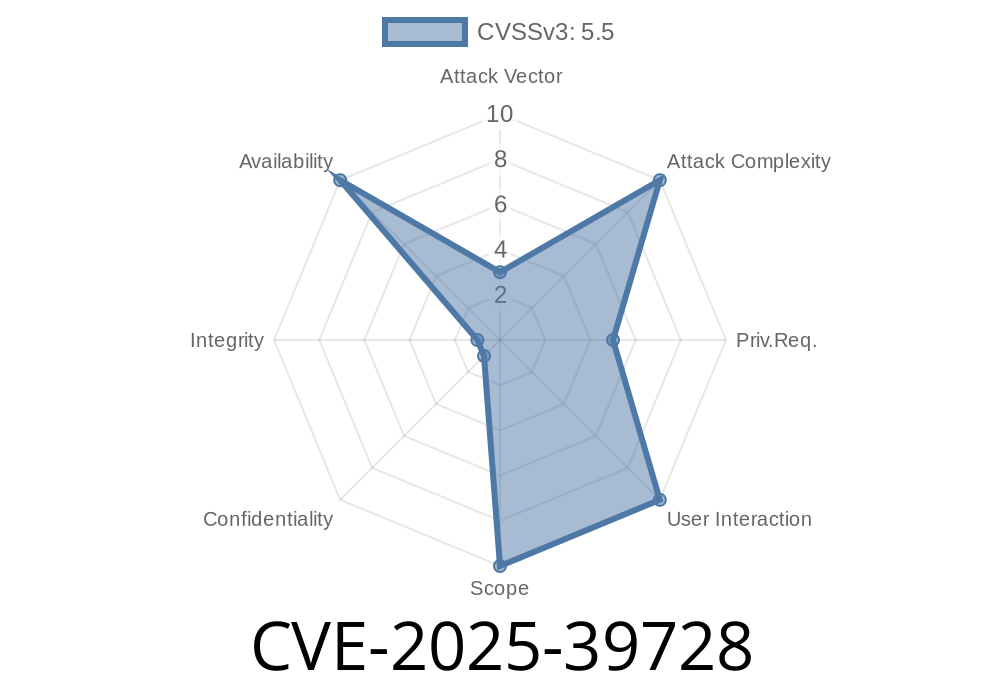The Linux kernel is the heart of almost every Android and many server devices, making security and stability fixes crucial to billions of users worldwide. Recently, a kernel bug — now tracked as CVE-2025-39728 — was fixed in the samsung_clk_init() function, preventing systems from crashing during boot due to a subtle error when certain compile-time options were enabled.
This long-form post breaks down the bug, its impact, the patch, and offers a code snippet illustrating what went wrong. Let's explore how this small fix prevents catastrophic panics on affected hardware.
What Is CVE-2025-39728?
CVE-2025-39728 refers to a vulnerability in the Linux kernel’s Samsung clock ("clk") driver. The function samsung_clk_init() was indexing into an array before properly setting its size, leading to a kernel crash under particular debug builds or options.
This is particularly relevant when compiled with UBSAN_ARRAY_BOUNDS (Undefined Behavior Sanitizer), which checks for out-of-bounds array accesses at runtime.
Who Is Affected?
- Devices using the Samsung clock controller kernel code (think Samsung Exynos-based phones, tablets, developer boards, and some ARM servers).
- Kernel builds with the sanitizer flag UBSAN_ARRAY_BOUNDS=y enabled — this is mainly developers, testers, or custom ROM communities, but even end-users could be at risk if this bug is triggered.
Here’s what the kernel log showed
UBSAN: array index out of bounds: 00000000f2005512 [#1] PREEMPT SMP
<snip>
Call trace:
samsung_clk_init+x110/x124 (P)
samsung_clk_init+x48/x124 (L)
samsung_cmu_register_one+x3c/xa
exynos_arm64_register_cmu+x54/x64
__gs101_cmu_top_of_clk_init_declare+x28/x60
...
Translation:
In samsung_clk_init(), code tried to access ctx->clk_data.hws (an array pointer) before ctx->clk_data.num (the number of array elements) was set. If an out-of-bounds access happened, the sanitizer panics and the kernel crashes.
Here's a simplified (and slightly cleaned up) snippet illustrating the problem
static int samsung_clk_init(..., struct samsung_clk_provider *ctx, ...)
{
/* ... */
// BAD: Access array before number-of-clocks is set
for (i = ; i < nr_clks; i++) {
ctx->clk_data.hws[i] = ...; // May crash if hws is not sized correctly yet
}
ctx->clk_data.num = nr_clks; // Setting num *after* use
/* ... */
}
The Fix
The fix is simple but crucial:
Assign num (the number of clocks) _before_ using the array.
Patch in pseudo-diff
static int samsung_clk_init(...)
{
- for (i = ; i < nr_clks; i++) {
- ctx->clk_data.hws[i] = ...;
- }
- ctx->clk_data.num = nr_clks; // too late
+ ctx->clk_data.num = nr_clks; // set this first!
+ for (i = ; i < nr_clks; i++) {
+ ctx->clk_data.hws[i] = ...;
+ }
}
See the official patch on the Linux Kernel Mailing List:
- linux-samsung-clk: Fix UBSAN panic in samsung_clk_init()
Exploit Details
Although this bug is not a classic security exploit (no privilege escalation or direct data leak), it has two important consequences:
Unexpected Behavior:
In fuzzing or sanitizer-enabled environments, such a bug might be used along with others for exploitation, especially if out-of-bounds memory reads or writes are triggered.
Watch the kernel panic during samsung_clk_init().
NOTE:
This is more a demonstration for kernel developers, debugging, and testers with recovery mechanisms ready.
Order matters, even in driver code: Always assign structure fields _before_ using them.
- Sanitizers = safety net: UBSAN and similar tools catch subtle bugs at build/run time, often before devices hit mainline or user hands.
- Keep systems updated: Even corner-case bugs like these can cause critical issues if unpatched, especially in mass-production environments.
References
- linux-samsung-clk: Fix UBSAN panic in samsung_clk_init() Original Patch
- UBSAN in the Linux Kernel Docs
- Linux Kernel source (clk/samsung/clk.c)
- CVE-2025-39728 at cve.org (Pending)
Final Thoughts
CVE-2025-39728 is a good reminder that even minor programming mistakes in low-level, critical code can bring down entire systems. The fix is small — just a line reordered — but the impact is big for device stability.
If you maintain Linux on ARM, Samsung Exynos, or use custom kernels: apply this patch, enable sanitizers, and stay safe!
Stay tuned for more simple-language breakdowns of recent kernel CVEs. If you have any questions or want deeper technical examples, let me know in the comments!
Timeline
Published on: 04/18/2025 07:15:44 UTC
Last modified on: 04/29/2025 14:18:06 UTC
